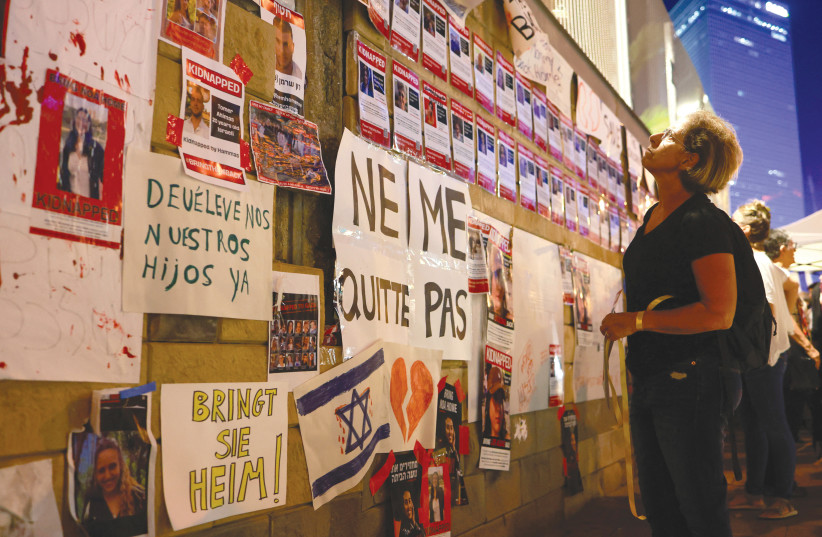Shany Granot-Lubaton was on stage leading a rally for democracy at Dag Hammarskjold Plaza 114 days ago, protesting against Prime Minister Benjamin Netanyahu who was speaking around the corner at the United Nations Headquarters.
On Friday, Granot-Lubaton stood on stage in the same location leading the Hostage and Missing Families Forum 100 Days of Captivity demonstration.
Shany and her husband Omer organized the forum and protests with hostage families using the infrastructure already in place for the democracy protests.
"If you would've asked me a year ago, 'Would you imagine you would stand on a stage in New York in front of thousands of people?' I would say no, but 100 days ago, it was kind of a normal thing for us," Shany said.
From October 6 overnight into October 7, the Whatsapp groups organizing democracy protests swiftly shifted to organizing supplies for Israel and mobilizing people in New York. The fundraising website was live on that Saturday morning by the time most New Yorkers woke up to the news.

This was even before they learned hostages were taken, Shany said.
"We were organizing rallies for democracy and then in a second, we've all realized that we're fighting for something else right now, which is the same Israel that we love," Shany said.
Omer's family
Omer's cousin Chen Goldstein-Almog, 48, was kidnapped from Kibbutz Kfar Aza with her three children - Adam, 17, Gal, 11, and Tal, 8.
Omer said he initially heard that six of his family members were killed before learning that two of them were killed and four taken hostage.
"We're very fortunate that [Chen] was released with her three children on November 26. They were reborn basically on that day," Omer said.
"They saw with their own eyes, the hostages there that were injured, that suffered from sexual abuse, torture, and lack of food and lack of medicine," Omer said. "We try to again emphasize how important and how urgent it is for the ones who are still in Gaza."
Omer said he's been coming to the UN almost every week.
"I think that the UN, because of what we do, can no longer deny that this is the most horrible, biggest, longest hostage crisis ever. It's a humanitarian crisis and we want them to address it like it is," Omer said.
Omer works full-time and is a graduate student at Columbia University studying Public Administration. He and Shany have a two-year-old son.
They haven't been back to Israel since October 7.
"We have a very big mission, we're very needed. We think it's important that the world hear and see what we do, that we bring the families our story," Omer said. "So we're focusing on the work here in the US."
Shany said their hearts and minds have been "100% in Israel all this time."
"I can also say that as much as I wanted to be surrounded by my family and my friends, and to support them and to be supported, in many ways in Israel it feels like whenever somebody says 'I'm sorry for your loss,' the other person answers 'I'm sorry for your loss,'" Shany said.
"We're such a small country and everybody lost someone. It feels like nobody can really support somebody else back home, they're all devastated," she said. "They're all heartbroken, and in many ways what we're doing here gives them a lot of strength and support."
"We're such a small country and everybody lost someone. It feels like nobody can really support somebody else back home, they're all devastated."
Shany Granot-Lubaton
Shany said standing on stage on Friday felt like a great success because she saw so many people from different sects of Judaism, from reform to conservative to orthodox.
Shany said she's "happy and lucky" so many supporters joined their demonstration on Friday.
"If you saw the invite, you would see such a variety of Jewish organizations we had never seen. Right to left, liberal, and progressive to conservative. I mean everybody was here on this invite," she said. "And I think it means everything because we're in this moment where everybody has to be together."
